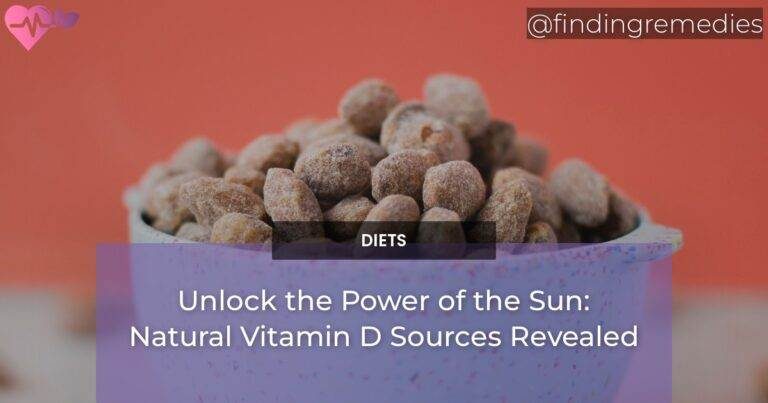Vitamin D has for long been known for its key role in maintaining healthy bones, muscles, and teeth. It is actually a common understanding that synthesis of this vital nutrient is best achieved when the body is exposed to large doses of sunlight. However, ongoing research and findings from the scientific community have revealed alternative sources of Vitamin D that don’t necessitate sun-bathing.
This article aims to provide a comprehensive look into these unparalleled natural sources of Vitamin D to help your body unlock its power from the sun. Furthermore, it will also explain the essentials of this micronutrient that make it of immense importance for your overall health.
Table of Contents
Natural Sources of Vitamin D
Vitamin D is an essential nutrient that helps our bodies absorb calcium and maintain bone health. It also plays a critical role in immune function, and recent research suggests it may even help prevent certain chronic diseases. While many people associate vitamin D with sunlight, there are also several natural sources of this nutrient that can be incorporated into your diet.
Limited Sun Exposure
While sunlight is one of the primary sources of vitamin D, many people have limited exposure due to their geographic location, occupation, or lifestyle. So can you still get enough vitamin D if you’re not getting enough sun? The answer is yes, but it may require some extra effort.
The amount of sun exposure needed to produce enough vitamin D varies based on several factors, including skin color, age, and geographic location. However, experts generally recommend getting 10-30 minutes of direct sunlight on your skin at least a few times a week to help maintain adequate vitamin D levels.
If you can’t get enough sunlight, there are several alternative natural sources of vitamin D that you can incorporate into your diet.
Alternative Natural Sources of Vitamin D
Some of the best natural sources of vitamin D include:
- Fatty fish, such as salmon, tuna, and mackerel
- Egg yolks
- Mushrooms
- Fortified foods, such as milk, orange juice, and cereal
Incorporating these foods into your diet can help ensure you’re getting enough vitamin D, even if you have limited sun exposure. For example, try making a salmon salad for lunch or adding mushrooms to your omelet in the morning. Additionally, fortified foods can be an easy way to boost your vitamin D intake, so be sure to check food labels for added nutrients.
Signs of Vitamin D Toxicity
While vitamin D is essential for our health, consuming too much of it can be dangerous. Some signs of vitamin D toxicity include:
- Nausea and vomiting
- Weakness and fatigue
- Loss of appetite
- Excessive thirst and urination
- Kidney problems
It’s important to note that vitamin D toxicity is rare and typically only occurs with excessive supplementation. However, it’s still essential to be aware of the risks and to speak with your doctor before starting any new supplement regimen.
Vitamin D Supplements
If you’re not getting enough vitamin D through diet and sun exposure, you may want to consider taking a supplement. However, it’s important to note that not everyone needs a supplement, and excessive supplementation can be harmful.
To determine if you need a supplement, speak with your doctor and get your vitamin D levels checked. If your levels are low, your doctor may recommend a supplement or alternative methods for increasing your intake. Some potential risks of taking a vitamin D supplement include:
- Kidney damage
- Excessive calcium buildup
- Drug interactions
Always speak with a healthcare professional before starting any new supplement regimen.
Vitamin D and Bone Health
One of the most well-known health benefits of vitamin D is its impact on bone health. Vitamin D plays a critical role in calcium absorption, which is essential for maintaining strong and healthy bones. Without enough vitamin D, the body can’t absorb calcium effectively, leading to weakened bones and an increased risk of fractures.
Risks of vitamin D deficiency for bone health include:
- Osteoporosis
- Rickets (in children)
- Increased risk of fractures
If you’re concerned about your bone health, speak with your doctor about getting your vitamin D levels checked and incorporating more vitamin D-rich foods into your diet.
Vitamin D and Immune Function
Recent research has shown that vitamin D may also play a critical role in immune function. Vitamin D receptors are present on immune cells, and vitamin D has been shown to help activate these cells and boost immune response.
Risks of vitamin D deficiency for immune function include:
- Increased risk of infection
- Autoimmune disorders
If you’re concerned about your immune function, speak with your doctor about getting your vitamin D levels checked and incorporating more vitamin D-rich foods into your diet.
Conclusion
Getting enough vitamin D is essential for maintaining bone health, immune function, and overall wellness. While sunlight is one of the primary sources of vitamin D, there are also several natural sources of this nutrient that can be incorporated into your diet. If you’re concerned about your vitamin D intake, speak with your doctor and consider adding more vitamin D-rich foods to your diet or taking a supplement under medical supervision.
Remember, vitamin D toxicity is rare, but it’s still essential to be aware of the risks and to speak with a healthcare professional before starting any new supplement regimen.

